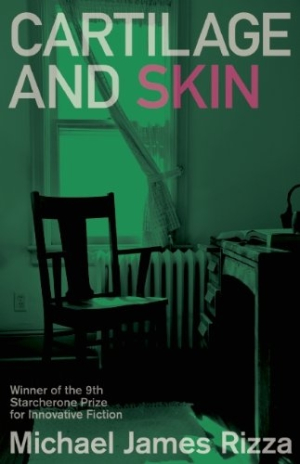
Cartilage and Skin
Our ever-changing perception of reality is at the heart of Michael James Rizza’s unsettling debut novel. In Cartilage and Skin, Rizza shines an uncomfortable light on his voyeuristic antihero, Dr. Parker, an eccentric recluse holed up in an anonymous apartment, working on an undefined manuscript. Parker has an odd relationship with the people around him, from the nameless boy he sends on errands to the agoraphobic neighbor whose mail he diverts, but the former professor doesn’t think these things odd. He’s quite adamant about his innocence, actually, calling to mind the pleading, hyperrational voice of the madman in Poe’s “Telltale Heart.”
Like Poe’s madman, Parker is an unreliable—and creepy—narrator from the start, but Rizza conveys his perspective eloquently and consistently, half convincing the reader that maybe he’s right. Maybe there’s a reasonable explanation for the envelopes of pornography he hides, or for the presence of a street urchin in his apartment. On the other hand, would an artist truly abscond with Parker’s manuscript and borrow his chapter headings for her painting titles, as he believes? And what do we make of Dr. Parker’s extended inner monologues that consider the close relationship between violence and sexuality?
Rizza keeps us just off-balance enough to entice us to turn the page, trying to figure out what the uncanny Dr. Parker has actually done and what he has imagined. Unlike traditional thrillers, Cartilage and Skin is not so much concerned with who has committed what crime, but with the very way we define said crimes.
Reviewed by
Sheila M. Trask
Disclosure: This article is not an endorsement, but a review. The publisher of this book provided free copies of the book to have their book reviewed by a professional reviewer. No fee was paid by the publisher for this review. Foreword Reviews only recommends books that we love. Foreword Magazine, Inc. is disclosing this in accordance with the Federal Trade Commission’s 16 CFR, Part 255.
